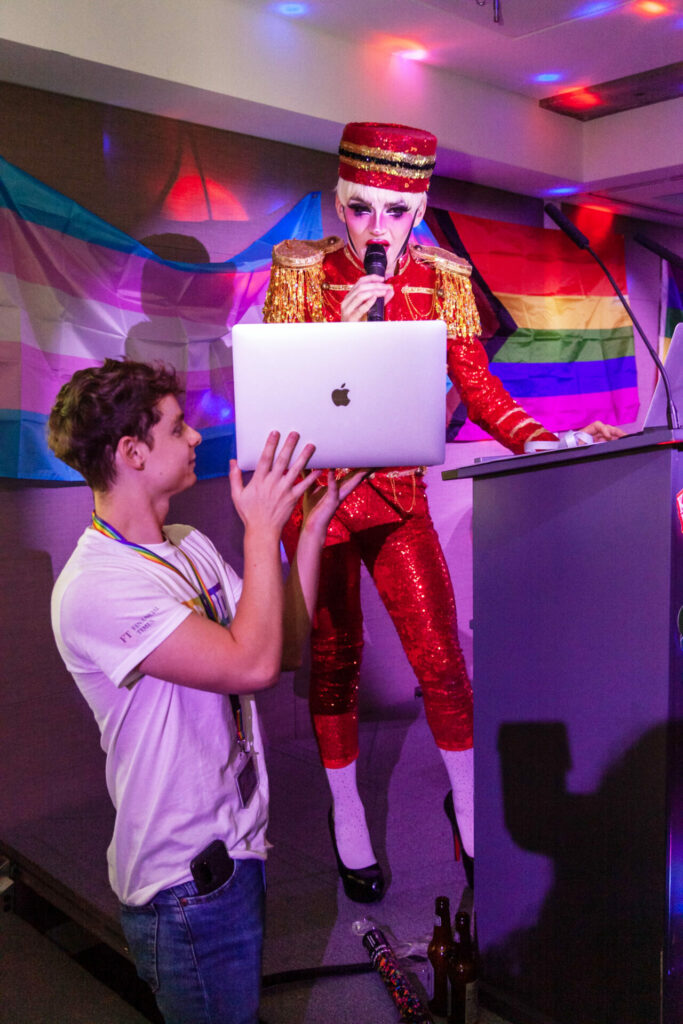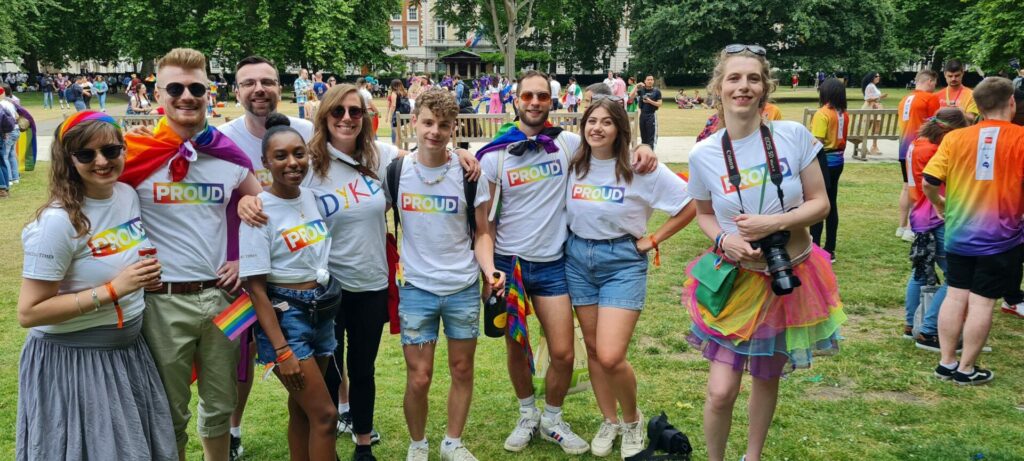Meet the software engineer helping make his workplace more LGBTQ-inclusive
In partnership with myGwork.

“More diverse companies are more successful companies.” Jamie Brown, Software Engineering at Financial Times and Co-Chair of Proud FT, spoke with myGwork about the impact of diversity on company success, the work achieved by their LGBTQ+ network, and the future of inclusivity in business.
With four years of experience at Financial Times, he is well aware of the standard of inclusivity his workspace provides. He also shares a unique perspective of the work FT are doing to make LGBTQ+ staff feel safe.
Jamie does well to set the scene when describing his upbringing. He refers to a remote village as something akin to the BBC comedy This Country, evoking images of corner shops and rather peculiar residents.
He fondly reminisces about early childhood memories as an effeminate kid. Of how his mother would occasionally drop hints like “Oh, I’ll always want a gay son!”, in an effort to pave the way for him and make sure he knew he would be accepted.

He didn’t understand at the time but reflecting as an adult he is immensely grateful towards his mum’s tactful behaviour. This openness about his femininity was further encouraged when Jamie would dress in drag and attend events at school where he could express himself. A core memory being the time he and a friend dressed up as Cheeky Girls. They performed in front of his entire school. It is perhaps safe to say that right from the start, Jamie had a certain streak of confidence when it came to how he presented his identity.
That confidence and sense of passion for authenticity and openness so present in his childhood followed Jamie through his teenage years, where he didn’t even necessarily come out to anyone, but simply kissed a boy at a party. Unfortunately, this provoked a negative reaction from a few students who poured drinks on the two boys. However, friends came to his defence. Jamie ultimately remained resolute in his pride, refusing to let this impact his nerve. He later confirmed his sexuality to his mum at a Pride event via text message. She simply responded: “Thought so. Love you.”
It was perhaps as a result of this unabashed assurance from friends and family, combined with his keen interest in activist work for the community and special interest in LGBTQ+ oriented journalism, that Jamie eventually became the co-chair of Proud FT – the Financial Times LGBTQ+ employee network. The work achieved at Proud FT sets out to make LGBTQ+ staff feel more included and listened to. It also sets out to make a space for people to feel empowered about their identities. Jamie talks with genuine pride about the progress of this network. He describes what he calls “the three pillars”, these being: internal improvements, external improvements, and community.

Internal improvements are all about enhancing the experiences of LGBTQ+ staff at Financial Times. This involves the implementation a trans inclusion policy – the first of its kind at a media organization – wherein Proud FT worked alongside transgender charity Gendered Intelligence to create a framework and guide surrounding respectful treatment of the trans community.
Jamie explains the small but effective changes this policy could help inspire. Such as the inclusion of sanitary products in the men’s and unisex toilets. Or adding pronouns to name badges, that could make a world of difference to trans and gender nonconforming employees. The external improvements refer to the work done by Financial Times staff to assist those outside the company, through charity work and campaigning. From Pride Month events to supporting FLIC (Financial Literacy and Inclusion Campaign), Proud FT uses the privileges of Financial Times to provide a platform for smaller organisations. Giving them the support they need to grow. Jamie’s description of the community pillar is indicative of the unique nature of Proud FT… As a network that whilst creating lasting change, also centres joy and camaraderie at the forefront of its endeavours.
“It’s important that whilst we are bringing everyone together – having a good time, being a network. It’s really important. Because not only is networking important for the business, but it also brings everyone else into the other pillars as well.”
The group has around 50 members so far, who all meet for monthly social events. As well as using the opportunity to get to know his colleagues better outside their work environment, Jamie also enjoys the chance to get feedback on his leadership and take onboard methods of self-improvement. The development of ERGs (Employee Resource Groups) and their importance in modern businesses has been a vital factor in the success of Financial Times.
“Before I joined FT, I didn’t really understand what ERGs do,” he says. “[Or] why they’re so important. But it’s all about having people with lived experiences separate to the more corporate roles. In HR, you’ve got people that are invested on the business side. So perhaps won’t necessarily raise the more uncomfortable points. We’ve got trans people in our community who raised things. They may not feel confident enough to go speak to someone in HR about it. So instead have have come to the network and we can bring that forward as a group.”
It is clear to see that Jamie is keen to provide the best safe space possible for his LGBTQ+ friends and colleagues and works hard to progress the business in any meaningful way. The impact and true influence of these efforts was reflected when Proud FT was nominated for a Rainbow Honours Award in 2022.
There was no hesitation when it came to the question of the future focus of LGBTQ+ equality. Jamie showed his immediate support and concern for the welfare of the transgender community. He is adamant that a company cannot truly be successful without diversity and inclusion. And with an increasing number of people feeling comfortable to share their gender identity, demonstrates the importance of providing a safe space for trans and non-binary people.
“Trans issues are at the forefront of what we need to see for LGBTQ+ equality,” he observed. “Ultimately if we keep progressing, people will be more accepting of trans people. But we need to keep fighting. So anything we can do to keep pushing this on, to stand by our trans siblings is vital. This is at the forefront of what we are working towards at Proud FT.”
